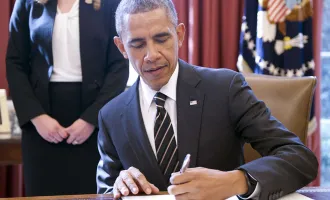
This Date in UCSF History: On Patriotism
Originally published in Synapse on December 15, 1965.
So much has been said about patriotism lately that your editor was motivated to do some searching in order to find what other Americans have said regarding this sensitive issue.
Much has been said by men like Jefferson and Madison who found this subject of the greatest import. But nowhere was the subject more eloquently expressed than in an essay by Mark Twain, written in the early 1900’s and published in ‘Europe and elsewhere’ in 1923.
He writes: “Patriotism is merely a religion — love of country, worship of country, devotion to the country’s flag and honor and welfare. In absolute monarchies it is furnished from the throne, cut and dried, to the subject; in England and America it is furnished, cut and dried, to the citizen by the politician and the newspaper.
“The newspaper and politician-manufactured patriot often gags in private over his dose; but he takes it and keeps it on his stomach the best he can. Blessed are the meek. Sometimes in the beginning of an insane shabby political upheaval, he is strongly moved to revolt, but he doesn’t do it — he knows better.
“He knows that his maker would find out… the maker of his patriotism, the windy and incoherent six-dollar subeditor of his village newspaper… and would bray out in print and call him a traitor. And how dreadful that would be. It makes him tuck his tail between his legs and shiver.
“We all know — the reader knows it quite well — that two or three years ago nine-tenths of the human tails in England and America performed just that act. Which is to say, nine-tenths of the patriots of England and America turned traitor to keep from being called traitor. Isn’t it true? You know it to be true. Isn’t it curious?
“Yet it was not a thing to be very seriously ashamed of. A man can seldom — very, very seldom — fight a winning fight against his training; the odds are too heavy. For many a year — perhaps always — the training of the two nations had been dead against independence in political thought, persistently inhospitable toward patriotism manufactured on a man’s own premises, patriotism reasoned out in the man’s own head and fire — assayed and tested and proved in his own conscience.
“The resulting patriotism was a shopworn product procured at second hand. The patriot did not know just how or when he got his opinions, neither did he care, so long as he was with what seemed the majority — which was the main thing, the safe thing, the comfortable thing.
“Does the reader believe he knows three men who have actual reasons for their pattern of patriotism — and can furnish them? Let him not examine, unless he wants to be disappointed. He will be likely to find that his men got their patriotism at the public trough and had no hand in its preparation themselves.
“…Training does wonderful things… Nothing is above its reach or below it. …It can turn bad morals to good, good morals to bad… in a year — even in six months. Then men can be trained to manufacture their awn patriotism. They can be trained to labor it out in their own heads and hearts and in the privacy and independence of their own premises. It can train them to stop taking it by command, as the Austrian takes his religion.”
And a few years later he wrote:
“It is at least somewhat comforting to see that the pseudopatriot has been around for years and that for years the solid intelligent reason has to some extent prevailed. But today with the mass media at the disposal of many of these people may have their voices greatly amplified.
“What any individual is to do about this dangerous situation is largely up to his conscience, and it is in developing and maintaining the conscience of man that the hope for a sane future depends.”



